Smoke and mirrors make confusion, not peace

According to EU High Representative Borrell, Saturday’s meeting between Serbian President Vucic and Kosovo Prime Minister Kurti was a success. It resulted in an “Implementation Annex” to the Agreement on the Path to Normalisation of Relations. There are two macro problems:
- It is focused on process, not substance.
- Serbia again refused to sign.
Process not substance
The major procedural innovation is incorporation of the obligations in the two agreements into both country’s EU accession obligations. The new agreement also foresees an EU-chaired monitoring group. These provisions have been implicit all along. They obligate the EU more than they obligate Serbia and Kosovo. Moreover, the obligation does not extend to recognition of Kosovo’s sovereignty and territorial integrity, since the normalization agreement falls short of that benchmark.
The implementation annex also obligates Pristina to begin negotiations “immediately” on self-management for the Serbian community in Kosovo. This reformulation of the 2013 agreement to create an Association of Serb-majority Municipalities has two notable features:
First: it avoids the specific institutional form of the original. That in Pristina’s eyes represented a potential threat to Kosovo’s sovereignty and territorial integrity.
Second: it references the “Serbian community.” This suggest it applies not to existing municipalities but rather only to those inside Kosovo who consider themselves Serbian citizens.
The first is clearly to Kosovo’s advantage. The second is to Serbia’s, since it eliminates obligations to most non-Serbs.
The new agreement adds other procedural niceties. The obligations of the original agreement are to be implemented independent of others and the order in which they are mentioned. None are to be blocked. All that is good.
No signatures
Once again, President Vucic refused to sign the agreement. Vucic’s motives are clear. He fears domestic reaction in Serbia, where ethnic nationalist passions and hatred of Albanians reign supreme. He wants to avoid any formal equality with someone who will insist on being identified as the Prime Minister of the (independent and sovereign) Republic of Kosovo (or maybe even Kosova, the Albanian preference).
EU and US officials would have you believe this does not matter. But it does. Under international law, signed agreements obligate a state. Unsigned ones do not. Serbia could walk away from all the agreements with Kosovo, as they are unsigned. In fact, it has not implemented many. Nor has Kosovo. Signatures would make a big difference. That is why Vucic resists.
The Americans and Europeans have pressed Kurti hard to obligate Kosovo. They have withheld goodies and criticized him publicly. It shows. He is willing to sign.
Brussels and Washington have taken a different approach with Vucic. It also shows. They have rewarded him in advance. Neither criticizes Serbia’s drift towards autocracy or its corruption. Both welcome Vucic and his minions for visits and provide ample assistance, including more than one billion recently for railroad reconstruction. This appeasement gives him the diplomatic space he needs for refusal to sign. Even the donor conference promised in the more recent agreement is of marginal interest, as Serbia has most of what it wants already.
What is missing
We always need to ask “what is missing?” That is often more significant in assessing a diplomatic maneuver than what is apparent. Here are a few missing elements:
- There is no reciprocity. Serbia gets its “self governance” for its citizens in Kosovo but the Albanians who live in southern Serbia do not get anything comparable.
- Serbia’s harassment of Serbs who participate in Kosovo institutions is not mentioned. This includes municipal governments as well as the Pristina institutions, including the Kosovo Security Force.
- There are no deadlines to accomplish the goals set out. An implementation agreement is only as good as its timetable.
- While a signature on this agreement might amount to virtual recognition, that possibility is not mentioned, even as a remote goal. Nor is there any sign of recognition by the five EU non-recogniers.
A process-focused agreement without signatures leaves a lot to future negotiations. This one is more smoke and mirrors than substance. It is more likely to generate further confusion than peace.
Stevenson’s army, March 11
– Chinese diplomacy secures Saudi-Iranian rapprochement.
– Some analyses.
– WSJ says China also winning in South China Sea.
– Lawfare piece sees mild congressional restraints on use of force.
– SAIS profs Barno & Bensahel analyze US military recruiting problems.
My SAIS colleague Charlie Stevenson distributes this almost daily news digest of foreign/defense/national security policy to “Stevenson’s army” via Googlegroups. I republish here, with occasional videos of my choice. To get Stevenson’s army by email, send a blank email (no subject or text in the body) to stevensons-army+subscribe@googlegroups.com. You’ll get an email confirming your join request. Click “Join This Group” and follow the instructions to join. Once you have joined, you can adjust your email delivery preferences (if you want every email or a digest of the emails).
Stevenson’s army, March 10
– Alerted by FT’s John Thornhill, I want to share the UK Defence Ministry’s commissioned Sci-Fi stories to help think about future warfare.
– Lithuanian intelligence says Russia can fight two more years at current pace in Ukraine.
– NYT reveals what Saudis want from US in return for normalizing relations with Israel.
– There still aren’t many budget details for defense and foreign policy. Defense News has this summary.
– And Indopacom has leaked its wish list.
– Politico notes European differences over China.
– Max Boot confesses he has been wrong about foreign policy.
– WaPo earlier had interesting maps about US & Ukraine.
My SAIS colleague Charlie Stevenson distributes this almost daily news digest of foreign/defense/national security policy to “Stevenson’s army” via Googlegroups. I republish here, with occasional videos of my choice. To get Stevenson’s army by email, send a blank email (no subject or text in the body) to stevensons-army+subscribe@googlegroups.com. You’ll get an email confirming your join request. Click “Join This Group” and follow the instructions to join. Once you have joined, you can adjust your email delivery preferences (if you want every email or a digest of the emails).
The easy way out leads to failure
I spoke yesterday at a US-Europe Alliance panel on the impact of the Russian invasion of Ukraine in the Western Balkans. Here are my notes:
Let me start by making three point I regard as obvious:
- Russian military aggression in Ukraine has a counterpart in the Balkans There the aggression is via hybrid warfare directed from Serbia, mainly against Kosovo, Bosnia and Herzegovina, Montenegro, and Macedonia.
- If Russia succeeds in gaining territory in Ukraine, we should expect a far more aggressive effort in the Balkans.
- If Russia fails in Ukraine, it will fail as well in the Balkans.
Why?
Why then, you should ask, has the State Department been so soft on Serbia, Russia’s main agent in the Balkans? The US has allowed billions of dollars of development bank investments to go to Belgrade. The Pentagon is trying to revive military cooperation with the Serbian army. The State Department backed unproductive and unjustified decisions by the HiRep in Bosnia that favored Croat extremists and sanctioned Serbs. American officials befriended and encouraged a narrowly elected pro-Russian government in Montenegro. They have insisted on early formation of an Association of Serb-majority Municipalities in Kosovo, a proposition that would weaken the still young Kosovo state.
Some regard these moves as recent. But they are better regarded as part of a long history of taking the easy way out in the Balkans. As difficult as they were, the Dayton accords seemed easier to Washington in 1995 than defeat of Republika Srpska. After Milosevic fell to the 2000 election in Serbia, the Americans quickly gave unequivocal support to his successors. They cut off funding to the Otpor Resistance movement that intended to keep a sharp eye on the democratization process. Senator Biden argued in a hearing several years later that it would be better to get Serbia into the EU accession process than to insist it earn candidacy on the merits.
Serbia’s response
The Serbian government took advantage of that support to reject the Ahtisaari plan for Kosovo’s independence. It instead established Serbia as a militarily “neutral” country. Belgrade rearmed as best it could, mainly with Russian help. When Serbia’s disappointing but relatively liberal “democrats” lost the 2012 election, Washington lined up behind their nationalist successors.
Many thought they could be convinced to resolve the Kosovo issue in a “Nixon to China” move. Presidents Nikolic and then Vucic declined to do so. President Vucic’s minions now talk openly about a “Serbian world.” That is analogous to Vladimir Putin’s “Russian world” and a synonym of Greater Serbia. It is only a matter of time before Serbia walks away from the French-German proposed agreement that Vucic refused to sign last month.
Washington however has been unresponsive and ineffective. Vucic’s unwillingness to sign, Republika Srpska’s “national day” display of force, Belgrade’s threats of military action in Kosovo, the Bosnia HiRep’s decision to change the way votes are counted the day after an election, the compromise of NATO secrets by Montenegro’s pro-Russian government, control of the press, harassment of liberal democrats, and corruption in Serbia—none of these developments have elicited an effective response from Washington.
Unedifying
The explanation is far less than edifying. Washington doesn’t give a hoot about the Balkans. The region is too complicated, too peripheral, too aggravating. So it delegates hegemony to a “pivotal state.” The State Department thinks that is Serbia, which is central geographically, larger than its neighbors, a bit better off economically, and a far more consolidated state than the other former Yugoslav republics.
If you delegate a pivotal state to control a region, you have to put up with most of its behavior, both in the region and at home. If the pivotal state in addition maintains good relations with your adversaries, you will fear a tilt in that direction. Hence the US government’s reluctance to call out Belgrade, even when it sides with Moscow and Beijing in foreign policy and slides inexorably toward autocracy at home.
This is a sad commentary, not only on American diplomacy. It sadly favors a Russian proxy over states truly aspiring to join the West. That’s ugly. But it is also sad for the region, which has good reason to fear instability. Bosnia, Kosovo, and Montenegro all face threats to their sovereignty and territorial integrity as a result of America’s treatment of Serbia as the pivotal state in the Balkans.
But it is sad also for Serbia, which no longer meets the Copenhagen democracy criteria for EU membership. Vucic can do what he pleases domestically, without concern about constraints on his power. And it is sad for Kyiv, which should worry that whatever the Americans agree in the Balkans they may copy in Ukraine. How about an Association of Russian-majority municipalities in Donbas?
To put it plainly: the easy way out leads to failure.
PS: Take a moment to look at Demush Shasha’s pertinent tweets from today:
Four important takeaways from today’s @freedomhouse “Freedom in the World 2023” report.
1. Kosovo is democratic trailblazer of the region. Kosovo made record annual democratic improvement and ranked as third most improved democracy in the world in 2022.
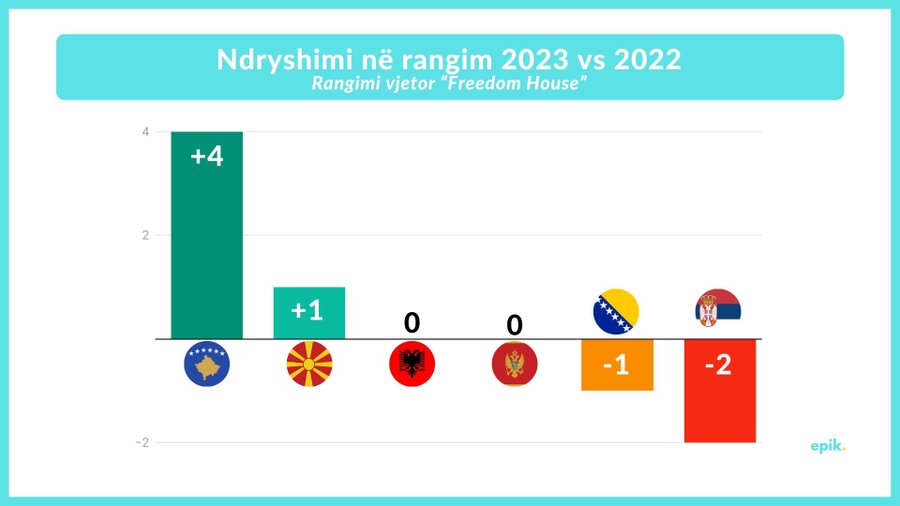
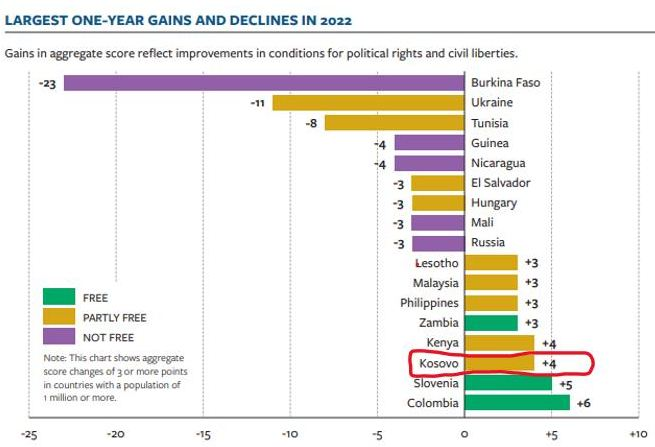
2. Kosovo and Serbia democracies are heading to totally opposite directions.
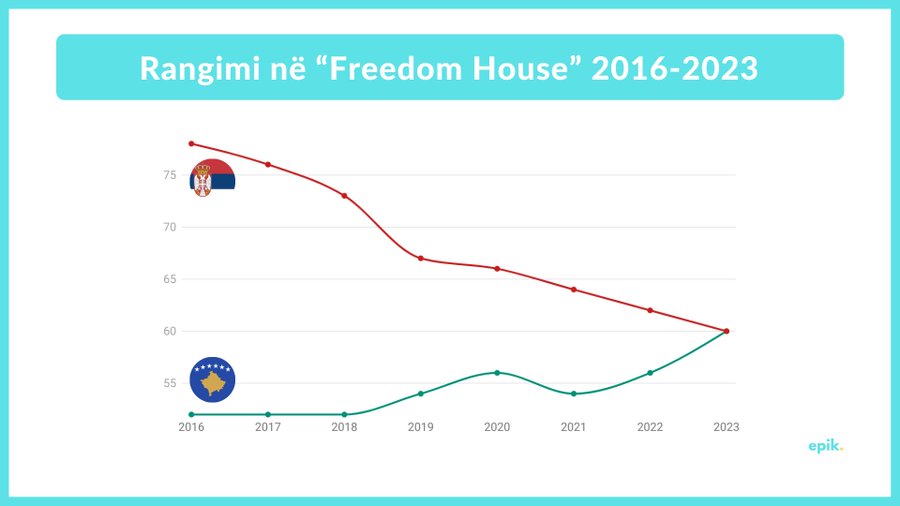
3. Looking at a longer time scale, only Kosovo and North Macedonia have today a better democracy then a decade ago. Albania has made no progress, while Serbia, Montenegro and Bosnia have worst democracies today then a decade ago.
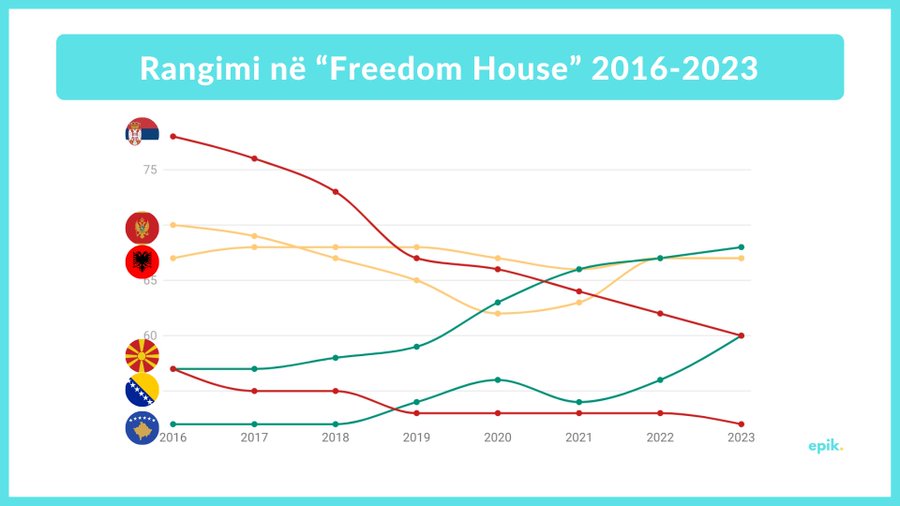
4. Serbia’s democratic collapse is in particular staggering. A decade long democratic nosedive has put it now in a category with Afghanistan and Myanmar.
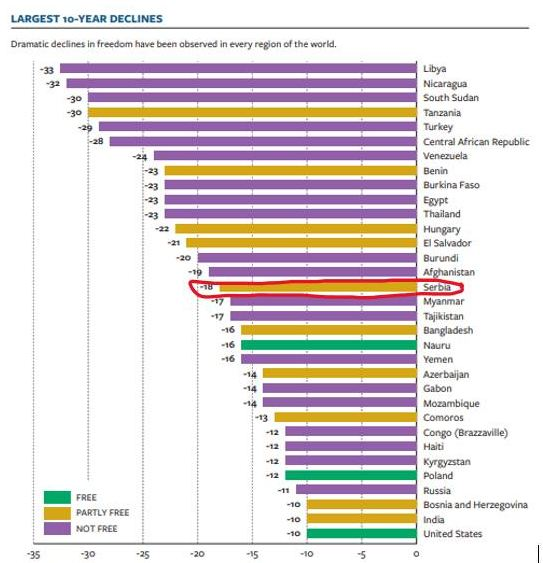
Stevenson’s army, March 9
– The administration’s proposed FY 2024 budget will be released at noon. Details will be here, as well as at departmental websites.
– Meanwhile, here’s what the CBO director told the House.
– And what NYT says the House GOP wants.
– Big interagency fight over giving data to ICC. Where you stand…
– I posted the IC annual assessment yesterday. Here’s DNI testimony on Ukraine.
– NBC says China is hard place for US spies.
– House rejected GOP measure to recall US troops from Syria.
– David Rothkopf warns about zero-sum China policy.
Now NYT let’s you search for first use of terms.
My SAIS colleague Charlie Stevenson distributes this almost daily news digest of foreign/defense/national security policy to “Stevenson’s army” via Googlegroups. I republish here, with occasional videos of my choice. To get Stevenson’s army by email, send a blank email (no subject or text in the body) to stevensons-army+subscribe@googlegroups.com. You’ll get an email confirming your join request. Click “Join This Group” and follow the instructions to join. Once you have joined, you can adjust your email delivery preferences (if you want every email or a digest of the emails).
Stevenson’s army, March 8
– NYT & others say Nordstream attack likely by pro-Ukraine group. Die Ziet has more:
New reporting in German media Tuesday indicates that Berlin’s investigation revealed “traces [that] lead in the direction of Ukraine,” identifying a team of six commandos — five men and one woman — that carried out the attack using a yacht rented from a Poland-based company. “Investigators found traces of explosives on the table in the cabin” of the vessel, per a translation of the Zeit Online report. “The group consisted of a captain, two divers, two diving assistants and a doctor.”
– Only 15% in US view China favorably, poll says.
– FP argues that Commerce has supplanted USTR as the real source of US trade policy.
– Legistorm reports: Almost two in five House offices didn’t touch their 2022 MRA increases.
– The Senate Intelligence Committee today held an open session with the IC leaders and released their unclassified threat assessment.
Posted by Keturah Hetrick on March 7, 2023
An unprecedented increase to the Members’ Representational Allowance gave the average House personal office an extra $314,000 in funds last year. But nearly two out of five offices didn’t use a single dollar of that increase, according to a LegiStorm analysis of the House’s latest spending data.
The average personal office disclosed spending 84.0% of its 2022 funds. On average, Democrats spent an extra 4.4% more of their budgets than Republicans – a difference of about $95,000 more per office.
2022’s 21% MRA increase was meant to help the House attract and retain staff talent.
To begin tapping into the MRA increase, each personal office needed to spend at least 82.65% of its 2022 budget. Only 62% did so. The remaining 38% of the House disclosed spending that would have been sustainable without any increase. It’s common for offices to report expenses after the year’s end, so the number of 2022 “underspenders” is likely to shrink somewhat.
Rep. Seth Moulton (D-Mass.) had the House’s highest spending. His office used more than 98.7% of its budget, including 85.1% on staffer pay. The average office spent 67.3% of its total budget on staffer pay.
My SAIS colleague Charlie Stevenson distributes this almost daily news digest of foreign/defense/national security policy to “Stevenson’s army” via Googlegroups. I republish here, with occasional videos of my choice. To get Stevenson’s army by email, send a blank email (no subject or text in the body) to stevensons-army+subscribe@googlegroups.com. You’ll get an email confirming your join request. Click “Join This Group” and follow the instructions to join. Once you have joined, you can adjust your email delivery preferences (if you want every email or a digest of the emails).




 RSS - Posts
RSS - Posts
